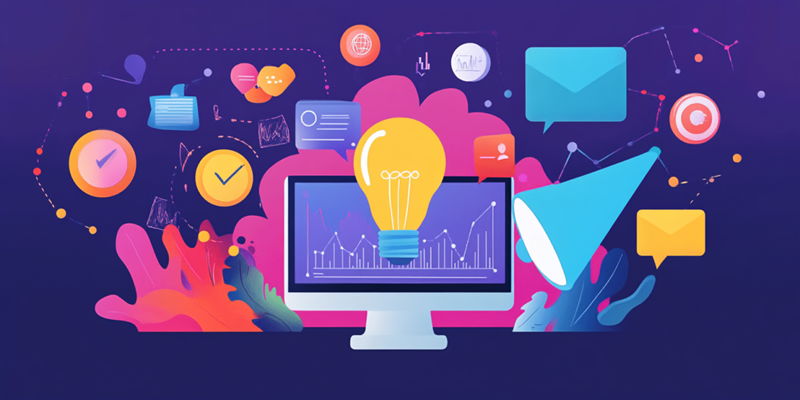In today’s fast-paced and highly competitive digital landscape, businesses can no longer afford to ignore the pivotal role of digital marketing in driving growth and achieving long-term success. A well-executed digital marketing strategy is essential for reaching the right audience through internet-based channels, ranging from websites and search engines to mobile devices and social media platforms.
Crafting a Winning Digital Marketing Strategy
The essence of a powerful digital marketing strategy lies in its ability to transform business growth by leveraging various online channels to promote products or services. It starts with a deep understanding of the target audience, which is crucial for devising effective campaigns and selecting the right media for maximum impact.
The Evolution of Digital Marketing
Digital marketing has evolved significantly since the 1990s, moving from basic online advertising to advanced automated software and sophisticated social media strategies. Today, it encompasses the use of multiple internet-based channels, and it’s critical for businesses to adapt to these changes to remain relevant.
Fundamental Pillars of Digital Marketing
At the heart of an effective digital strategy are several key pillars. Firstly, planning involves understanding digital transformation, budgeting, ROI, and branding. Next, setting measurable goals and analyzing metrics across various digital channels allows for accurate forecasting and customer profiling. Media is broken down into three categories: paid, earned, and owned, each playing a unique role in the broader strategy. Content is another crucial element, requiring creation that’s compelling and optimized for every stage of the sales funnel. Finally, customer experience, marked by attributes like speed, convenience, consistency, and friendliness, alongside conversational messaging through tools like mobile notifications, email marketing, and live chat, is vital for engaging the audience.
Types of Digital Media Assets
Digital media assets can be broadly categorized into owned, paid, and earned media. Owned media consists of channels directly controlled by the company, such as its website and social media pages. Paid media includes third-party advertisements, influencer marketing, and paid social ads. Earned media refers to organic mentions in third-party content, including reviews and user-generated content.
The Digital Marketing Strategy Cycle
An effective digital marketing strategy follows a cyclical process. It begins with an analysis, often using a SWOT framework to identify strengths, weaknesses, opportunities, and threats. Goals should be SMART—specific, measurable, attainable, realistic, and timely. Market segmentation is essential, involving demographic, geographic, behavioral, and psychographic factors. Creating buyer personas helps tailor marketing efforts to ideal customer profiles. Subsequent phases involve developing and optimizing content for owned, earned, and paid media campaigns. Continuous tracking of KPIs and refining strategies ensure sustained effectiveness.
The Sales Funnel for Marketers
A well-structured sales funnel guides the marketing process through four key stages: awareness, consideration, decision, and retention. Each stage demands specific content and strategies to nurture leads and convert them into loyal customers.
Effective Internet Marketing Tactics
Several internet marketing tactics prove instrumental in realizing a successful strategy. A well-optimized website forms the foundation of an online presence. Content marketing, covering blog posts, eBooks, and lead magnets, keeps audiences engaged. SEO techniques—both on-page and off-page—enhance visibility. Leveraging influencer and video marketing on platforms like YouTube, alongside email marketing for lead nurturing and customer retention, is crucial. Social media advertising and paid search can deliver immediate results through targeted ads.
Trends and Expert Consensus
Experts agree that a comprehensive and fluid digital marketing strategy is necessary. The integration of data-driven insights, ongoing analysis, and adaptability to emerging technologies and evolving consumer behaviors are pivotal trends shaping the future of digital marketing.
Synthesis and Execution
In today’s rapidly evolving and fiercely competitive digital landscape, businesses can’t afford to overlook the critical importance of digital marketing in driving growth and ensuring sustainable success. An expertly crafted digital marketing strategy is indispensable for connecting with the right audience via internet-based channels. These channels include websites, search engines, mobile devices, and social media platforms.
A successful digital marketing campaign goes beyond merely having an online presence; it requires a strategic approach that leverages data analytics, SEO, content marketing, email marketing, and social media engagement to reach and resonate with target demographics. Businesses must harness the power of these tools to create personalized and compelling experiences that convert prospects into loyal customers.
Moreover, digital marketing provides invaluable insights into consumer behavior, preferences, and trends. Utilizing these insights allows businesses to refine their strategies quickly, optimize marketing efforts, and ultimately, achieve a competitive edge. Therefore, a robust digital marketing plan is not just a luxury but a necessity for any business aiming to thrive in today’s digital age.

